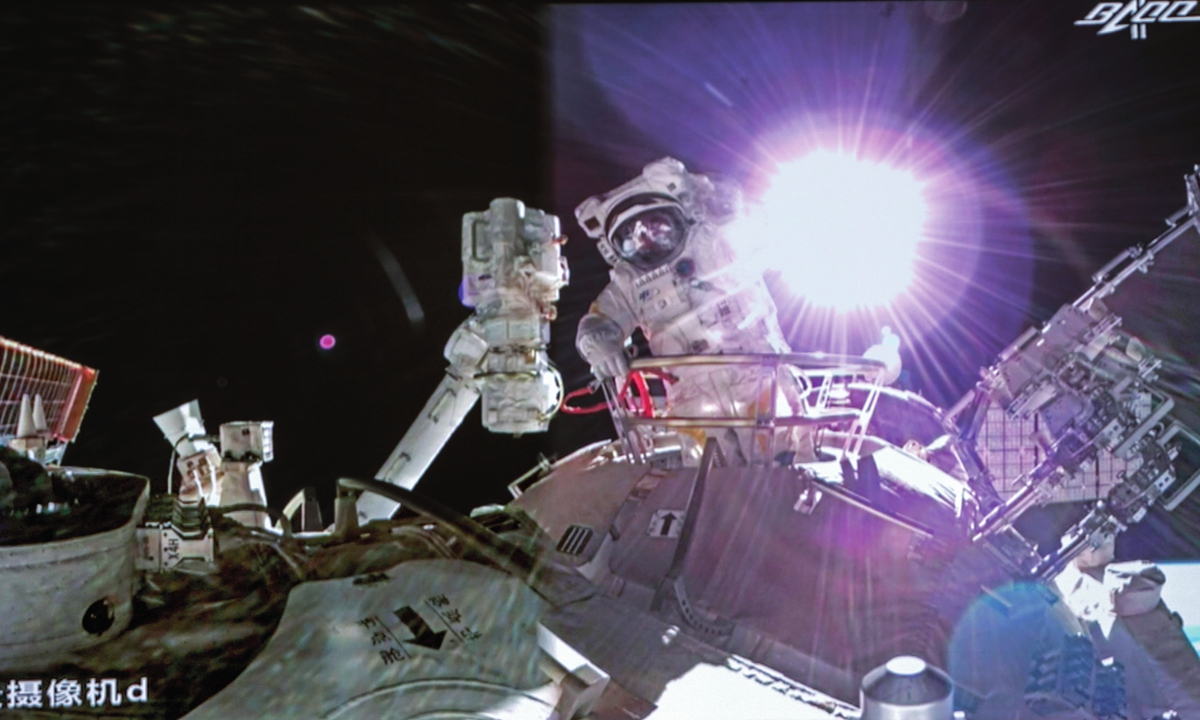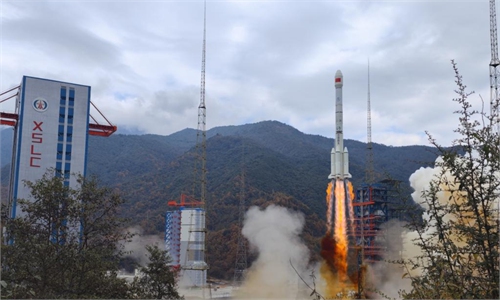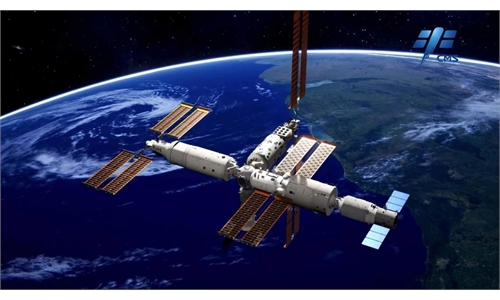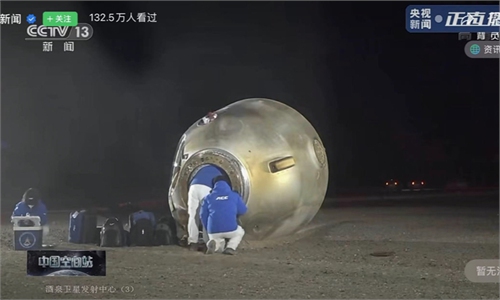HK nominates 40 taikonaut candidates, creating sense of participation among youth: lawmaker

Shenzhou-13 taikonaut Ye Guangfu exits China's orbiting space station core module Tianhe on an extravehicular activity (EVA), the China Manned Space Agency said on December 26, 2021. Ye and fellow crew member Zhai Zhigang were conducting the second spacewalk of the Shenzhou-13 mission. Photo: Xinhua
China's Hong Kong Special Administrative Region (HKSAR) has concluded its first round selections for payload specialists for the national manned space program and nominated 40 qualified candidates that could potentially be part of the fourth class of taikonauts, Secretary of HKSAR Innovation, Technology and Industry Bureau Sun Dong revealed recently.
According to Sun, a total of 120 people applied for the posts and 40 people - 20 men and 20 women - passed the first round of selection.
This new development came shortly after the China Manned Space Agency (CMSA) launched the recruitment process for the fourth batch of taikonauts in September 2022. Under the process, 12 to 14 candidates will be selected, including seven or eight space pilots and around six flight engineers and payload specialists.
It marked the first time that China recruited taikonaut candidates from HKSAR. Global Times learned from the CMSA previously that three rounds of selections would be carried out before the candidates are eventually recruited into the program.
The taikonaut selection process in Hong Kong was held strictly in accordance with national standards, according to Sun. Apart from physical performance, educational background and skills proficiency, applicants' enthusiasm for the aerospace industry was also taken into consideration, he told the media.
Sun said he had met all the 40 candidates and was impressed by their performances. Next, the HKSAR government will coordinate with the country's authorities to launch the next round.
Payload specialists, one of the categories of astronauts classified by types of mission, are professional scientific researchers who will carry out scientific and applied research in space stations. During these missions, payload specialists are mainly responsible for conducting aerospace experiments or researches, operating space laboratory equipment and managing daily operations of space stations with other astronauts.
Tang Fei, a member of the HKSAR Legislative Council, told the Global Times on Monday that the taikonaut selection would create a sense of participation among the Hong Kong youth, as it would mean that instead of just audience members of the country's aerospace endeavors, they could now be actual participants in the great cause.
It would also foster a great sense of pride and identification among young students, he said.
Taikonauts selection would also boost the quality of the city's scientific education and encourage more young students to devote themselves to innovation and scientific research, and choose it as a career, Tang noted.
China has made great strides in the aerospace sector in 2022, with many space industry observers hailing it as a year of great advances.
China's Long March rocket family, developed by the country's state-owned space giant China Aerospace Science and Technology Corporation, has conducted a record-breaking 54 orbital launches, all of which have been successful.
This year, construction of the China Space Station went into full gear and successfully completed all designated tasks for this phase with six missions - two manned missions, two cargo flights, and two extra-large module deliveries - all fired into space by Long March vehicles.
The Wentian and Mengtian lab modules weigh more than 20 tons each, and the Tianzhou cargo spacecraft also weighs more than 13 tons. In total, the six launch missions have sent more than 90 tons of payload to the space station.
China also completed the building of its three-module China Space Station by the end of 2022 according to plan, and with the successful direct work handover between the Shenzhou-14 and Shenzhou-15 crew, China's first permanent space station has entered a new phase in which the orbital spacecraft will always be attended by a taikonaut crew in orbit.
Four out of the total nine of the first batch of international experiments are also expected to be sent to the China Space Station in 2023, according to the UN Office for Outer Space Affairs (UNOOSA) Acting Director Niklas Hedman said in a recent interview, who also lauded the space station as "truly international" and one that offers an "absolutely fantastic opportunity for researchers around the world."
The CMSA and the UN Committee on Peaceful Use of Outer Space (COPUOS) announced in June 2019 that these nine international projects in aerospace medicine, life sciences and biotechnology, microgravity physics and combustion science, astronomy and other emerging technologies are from 17 countries and 23 research bodies, including Polar-2, a Gamma-ray burst polarimetry project jointly proposed by Switzerland, Poland, Germany and China, and a spectroscopic investigation of nebular gas by India and Russia.
Chinese space observers said that the country's genuine openness in sharing the use of its mega space infrastructure greatly contrasts with and offsets the current turbulence around the world, which is the result of certain countries playing political games and forcing countries to take sides in bloc confrontation, even in space.




